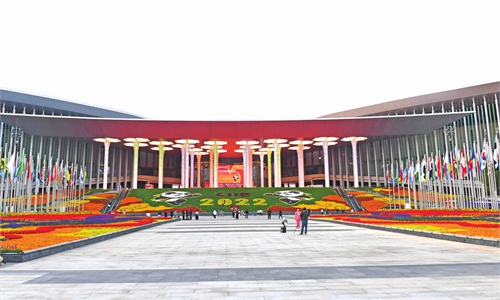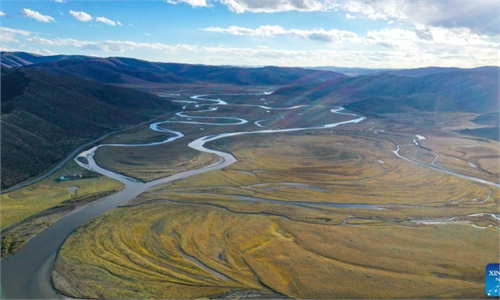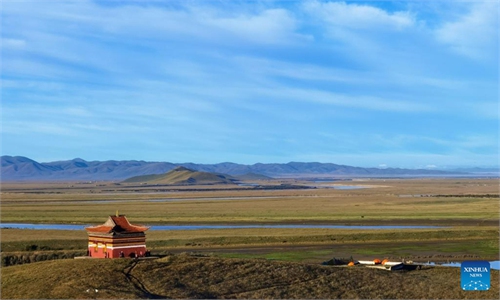IN-DEPTH / IN-DEPTH
UK birdwatcher impressed by China’s rising awareness in environment, biodiversity
Editor's Note:
China's modernization has been an epic journey over the past decades. Under the leadership of the Communist Party of China (CPC), China has become an attractive destination for many foreigners. Many such expats in the country have fulfilled their career aspirations, while some have found love and started families in China.
Why do they choose to live in China? How do expats in China view and interpret China's achievements and persistence measured from various perspectives?
The Global Times interviewed multiple international residents in China from all walks of life, some of whom have made tangible contributions to China's development, to learn about their understanding of the essence of Chinese culture, and gain an insight into how far China has advanced in its pursuit of development and rejuvenation over the last decade.
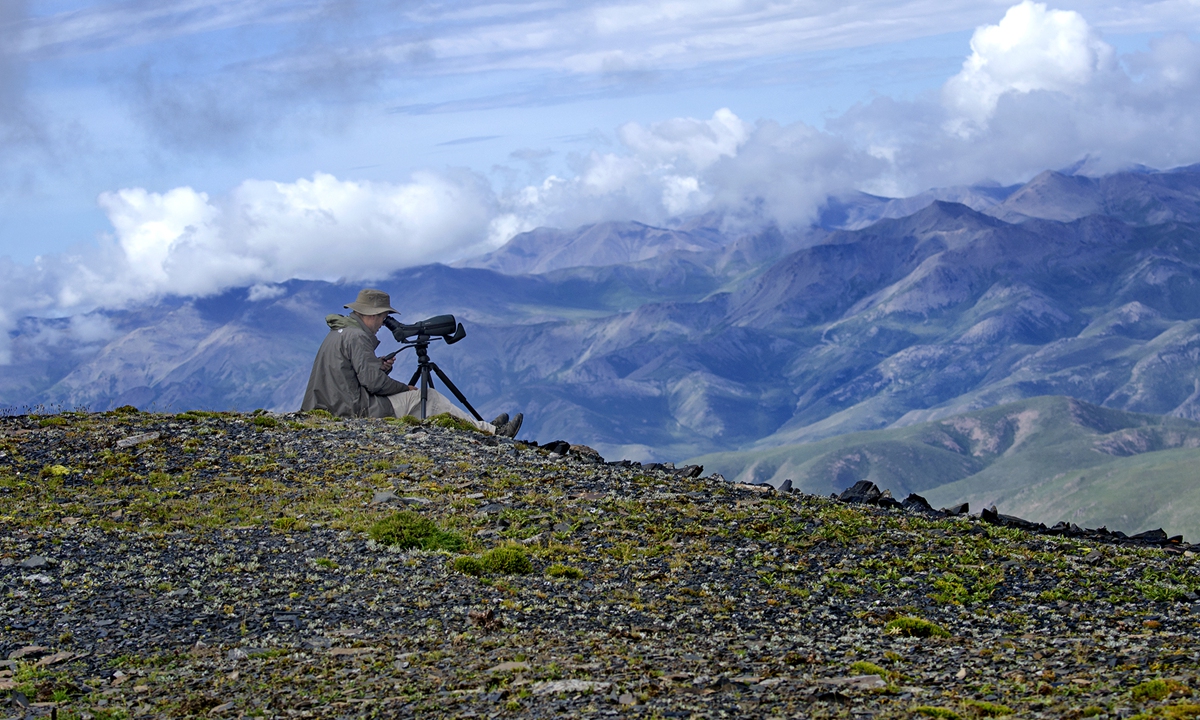
Late October, Terry Townshend climbed to the roof of a building in Beijing to check out a hand-sized recording device placed there which he had set up to "capture the sounds of migrating birds" at Beijing's Olympic Park, the largest green space in Asia.
"Through this we can hear all the birds flying over the building every night," Townshend, an ecologist from the UK, told the Global Times about his most recent project.
Every fortnight he came here to collect data and share it to universities' research centers for this year's birds tracking study.
As a birdwatcher living and having worked in Beijing for over a decade now, Townshend founded a website and formed a group for fellow enthusiasts called Birding Beijing. He works to raise environmental awareness among people, especially among young people, to help save some of China's most endangered birds, initiating projects to track some of Beijing's iconic birds, in addition to his own job as a former environmental advisor to the local government and now a fellow at a US-China independent environmental institute.
Beijing the 'service station'
Though observing the migratory birds in Beijing is now one of Townshend's main activities, his bond to China was forged 12 years ago, when the British conservationist was invited on an advisory capacity to aid China's environment improvements.
At the end of 2009, when the 15th session of the Conference of the Parties (COP 15) to the United Nations Framework Convention on Climate Change was held in Copenhagen, China made a key speech at the conference to stress the importance of the issue of climate change, and advocate for more cooperation in coping with climate change around the world.
Also in the same year, the non-governmental organization Townshend once worked with was invited by the Chinese government to cooperate in boosting support for China's general environmental laws on climate change. As the lead of the project, Townshend came to China for the first time.
After getting to know the country, he then decided to stay here for further research and chose to settle in Beijing.
"Most people may not realize [it] but Beijing is in fact right in the middle of a major migration route for countless global migratory birds that travel from as far north as the Arctic Circle to the southern hemisphere, for example, from Siberia all the way to Australasia," he noted. "Beijing is truly a service station on the highway for birds."
"Though I don't know exactly, in all these years I've seen probably 900 different species of wild animals including birds, and around 430 of bird species in Beijing alone," he said, "[that was] more than I ever saw in the UK," he said.
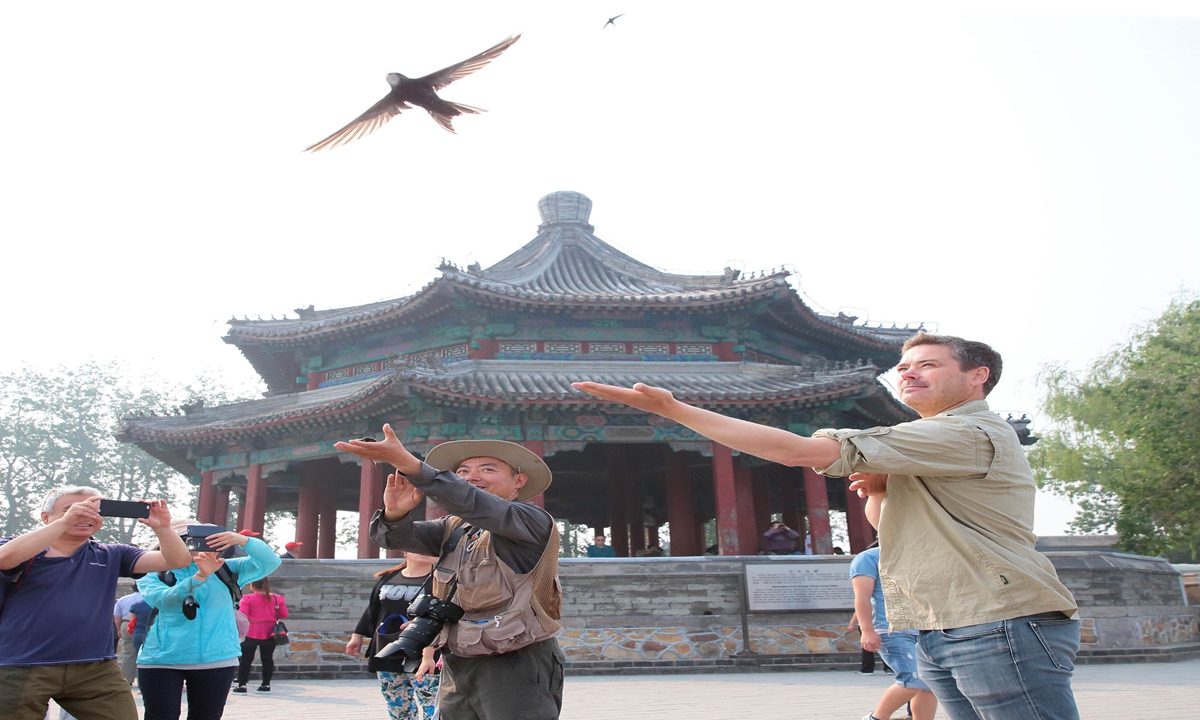
Here in the capital of China, the most common bird is the Beijing swift (Apus apus pekinensis). Known as the birds "who never land in their whole life," the mystery of this old aboriginal breed was unveiled after they were firstly recognized by experts in Beijing in 1870.
Mid this year, a paper on "accurately revealing the migration pattern of Beijing swifts" was published by Chinese and foreign research teams in an international journal Movement Ecology, which attracted much attention on this bird species.
From 2014 to 2018, with his liaison, an international research team was set up to track the migration route beginning at the Summer Palace.
After arriving in Beijing in April, the swifts begin their journey to Africa in late July. They first head northwest to Mongolia, fly north of the Himalayas, then south through Iran and central Arabia into tropical Africa, before they arrive in Namibia and the Western Cape.
On the way to biodiversity
"China has been valuing the recovery of nature in recent years, especially the planting of trees," Townshend said.
"However, trees are only valuable when they are the right trees in the right place. But it's also very important to have grassland and open areas and scrub land, because many species depend on these habitats. Many species don't like trees. We have to recognize that and provide the different types of habitats that they need," he advised.
Yet with the efforts that has been made in carrying out various targeted protections toward wetlands, plus the achievements published by the Chinese government and the future vision of The Wuhan Declaration made at COP14, the future looks bright for China's biodiversity.
During the 14th Meeting of the Conference of the Contracting Parties to the Ramsar Convention on Wetlands (COP14) held Wuhan and Geneva, The Wuhan Declaration was adopted calling for strong will and practical actions to promote the conservation, management, as well as a sustainable use of wetlands worldwide.
Years ago, in the Yellow Sea Wetland in Yancheng, East China's Jiangsu Province, an important migratory bird nesting area, the government issued bans on reclamation, solved pollution caused by industrial development along the coastal cities, and applied for the World Natural Heritage title in 2019 for the wetland's ultimate recovery.
Based on the latest 2022 data released by the central government, 602 wetland natural reserves were established, more than 1,600 wetland parks and numerous wetland protection communities were established, and the wetlands protection rate reached 52.65 percent across the country.
"These advances in fact illustrate China's changing mindset on the importance of the environment. In recent decades China has experienced huge economic growth, but at the same time it was at the cost of air, soil, and water pollution. But over the last 10 years we've seen a shift in the way of economic growth toward a higher quality growth. That means recognizing that you cannot have a strong economy without a strong environment."
And this all around support and growing awareness of environmental diversity also occurs in people's everyday activities. Townshend recalled to the Global Times that when he first came to China, it was even easier to find a new bird species in Beijing than to find another bird watcher.
"But now at any park on any day of the week you will find bird watchers. The number of bird watching societies in China has increased from three in the year 2000 to over a hundred today," Townshend said.
"There has been huge positive change in the past 10 years, but of course there is still a lot more that can be done," he said.
China's modernization has been an epic journey over the past decades. Under the leadership of the Communist Party of China (CPC), China has become an attractive destination for many foreigners. Many such expats in the country have fulfilled their career aspirations, while some have found love and started families in China.
Why do they choose to live in China? How do expats in China view and interpret China's achievements and persistence measured from various perspectives?
The Global Times interviewed multiple international residents in China from all walks of life, some of whom have made tangible contributions to China's development, to learn about their understanding of the essence of Chinese culture, and gain an insight into how far China has advanced in its pursuit of development and rejuvenation over the last decade.

Terry Townshend watches birds in Northwest China's Qinghai Province in 2019. Photo: Courtesy of Townshend
Late October, Terry Townshend climbed to the roof of a building in Beijing to check out a hand-sized recording device placed there which he had set up to "capture the sounds of migrating birds" at Beijing's Olympic Park, the largest green space in Asia.
"Through this we can hear all the birds flying over the building every night," Townshend, an ecologist from the UK, told the Global Times about his most recent project.
Every fortnight he came here to collect data and share it to universities' research centers for this year's birds tracking study.
As a birdwatcher living and having worked in Beijing for over a decade now, Townshend founded a website and formed a group for fellow enthusiasts called Birding Beijing. He works to raise environmental awareness among people, especially among young people, to help save some of China's most endangered birds, initiating projects to track some of Beijing's iconic birds, in addition to his own job as a former environmental advisor to the local government and now a fellow at a US-China independent environmental institute.
Beijing the 'service station'
Though observing the migratory birds in Beijing is now one of Townshend's main activities, his bond to China was forged 12 years ago, when the British conservationist was invited on an advisory capacity to aid China's environment improvements.
At the end of 2009, when the 15th session of the Conference of the Parties (COP 15) to the United Nations Framework Convention on Climate Change was held in Copenhagen, China made a key speech at the conference to stress the importance of the issue of climate change, and advocate for more cooperation in coping with climate change around the world.
Also in the same year, the non-governmental organization Townshend once worked with was invited by the Chinese government to cooperate in boosting support for China's general environmental laws on climate change. As the lead of the project, Townshend came to China for the first time.
After getting to know the country, he then decided to stay here for further research and chose to settle in Beijing.
"Most people may not realize [it] but Beijing is in fact right in the middle of a major migration route for countless global migratory birds that travel from as far north as the Arctic Circle to the southern hemisphere, for example, from Siberia all the way to Australasia," he noted. "Beijing is truly a service station on the highway for birds."
"Though I don't know exactly, in all these years I've seen probably 900 different species of wild animals including birds, and around 430 of bird species in Beijing alone," he said, "[that was] more than I ever saw in the UK," he said.

Terry Townshend and local birdwatchers observe birds in the Summer Palace of Beijing in 2015. Photo: Courtesy of Townshend
Here in the capital of China, the most common bird is the Beijing swift (Apus apus pekinensis). Known as the birds "who never land in their whole life," the mystery of this old aboriginal breed was unveiled after they were firstly recognized by experts in Beijing in 1870.
Mid this year, a paper on "accurately revealing the migration pattern of Beijing swifts" was published by Chinese and foreign research teams in an international journal Movement Ecology, which attracted much attention on this bird species.
From 2014 to 2018, with his liaison, an international research team was set up to track the migration route beginning at the Summer Palace.
After arriving in Beijing in April, the swifts begin their journey to Africa in late July. They first head northwest to Mongolia, fly north of the Himalayas, then south through Iran and central Arabia into tropical Africa, before they arrive in Namibia and the Western Cape.
On the way to biodiversity
"China has been valuing the recovery of nature in recent years, especially the planting of trees," Townshend said.
"However, trees are only valuable when they are the right trees in the right place. But it's also very important to have grassland and open areas and scrub land, because many species depend on these habitats. Many species don't like trees. We have to recognize that and provide the different types of habitats that they need," he advised.
Yet with the efforts that has been made in carrying out various targeted protections toward wetlands, plus the achievements published by the Chinese government and the future vision of The Wuhan Declaration made at COP14, the future looks bright for China's biodiversity.
During the 14th Meeting of the Conference of the Contracting Parties to the Ramsar Convention on Wetlands (COP14) held Wuhan and Geneva, The Wuhan Declaration was adopted calling for strong will and practical actions to promote the conservation, management, as well as a sustainable use of wetlands worldwide.
Years ago, in the Yellow Sea Wetland in Yancheng, East China's Jiangsu Province, an important migratory bird nesting area, the government issued bans on reclamation, solved pollution caused by industrial development along the coastal cities, and applied for the World Natural Heritage title in 2019 for the wetland's ultimate recovery.
Based on the latest 2022 data released by the central government, 602 wetland natural reserves were established, more than 1,600 wetland parks and numerous wetland protection communities were established, and the wetlands protection rate reached 52.65 percent across the country.
"These advances in fact illustrate China's changing mindset on the importance of the environment. In recent decades China has experienced huge economic growth, but at the same time it was at the cost of air, soil, and water pollution. But over the last 10 years we've seen a shift in the way of economic growth toward a higher quality growth. That means recognizing that you cannot have a strong economy without a strong environment."
And this all around support and growing awareness of environmental diversity also occurs in people's everyday activities. Townshend recalled to the Global Times that when he first came to China, it was even easier to find a new bird species in Beijing than to find another bird watcher.
"But now at any park on any day of the week you will find bird watchers. The number of bird watching societies in China has increased from three in the year 2000 to over a hundred today," Townshend said.
"There has been huge positive change in the past 10 years, but of course there is still a lot more that can be done," he said.
